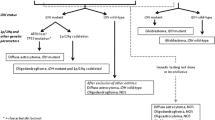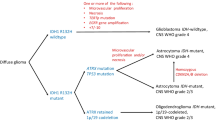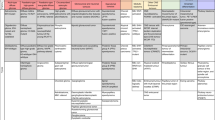Abstract
With the exception of radiation-induced tumors, benign meningiomas that are known to have developed within a defined time period are extremely rare. We have genetically characterized two cases of radiographically defined de novo, sporadic meningiomas—a 5-cm, left parasagittal tumor in a 61-year-old male and a 2.3-cm, right falx tumor in a 53-year-old female. Neither tumor was observed during MRIs performed for unrelated complaints 49 and 28 months before surgery, respectively. Both tumors were totally resected, and histopathological examination revealed WHO grade I meningiomas. In both cases, the MIB-1 staining indices were high for grade I meningioma (5.6% for case 1 and 9.1% for case 2), and abnormal accumulation of p53 were observed by immunohistochemistry. The two tumors shared losses of chromosome arms 1p and 7p by comparative genomic hybridization. The tumor suppressor merlin, product of the NF2 gene, was not detected in either tumor. These abnormalities found in common in both of the de novo meningiomas likely to play significant roles in the pathogenesis and/or rapid development of meningiomas. Moreover, taken together with previous studies, our findings indicate that the combined loss of 1p and 7p may play a critical role in the tumorigenesis of de novo, aggressive meningiomas.




Similar content being viewed by others

References
Brain Tumor Resistry of Japan (2009) Report of Brain Tumor Registry of Japan in 1984–2000. Neurol Med Chir (Tokyo) 49:1–96
Central Brain Tumor Registry of the United States (2011) CBTRUS Statistical Report: Primary Brain and Central Nervous System Tumors Diagnosed in the United States in 2004–2007. http://www.cbtrus.org. Accessed on 29 Aug 2011
Louis DN, Ogaki H, Wiestler OD, Cavenee WK (2007) WHO Classification of Tumours of the Central Nervous System. IARC, Lyon
Ohba S, Yoshida K, Hirose Y, Ikeda E, Kawase T (2009) Early malignant transformation of a petroclival meningothelial meningioma. Neurosurg Rev 32:495–499. doi:10.1007/s10143-009-0207-3
Saitoh Y, Oku Y, Izumoto S, Go J (1989) Rapid growth of a meningioma during pregnancy: relationship with estrogen and progesterone receptors–case report. Neurol Med-Chir 29:440–443
Karamitopoulou E, Perentes E, Tolnay M, Probst A (1998) Prognostic significance of MIB-1, p53, and bcl-2 immunoreactivity in meningiomas. Hum Pathol 29:140–145
Amatya VJ, Takeshima Y, Sugiyama K, Kurisu K, Nishisaka T, Fukuhara T, Inai K (2001) Immunohistochemical study of Ki-67 (MIB-1), p53 protein, p21WAF1, and p27KIP1 expression in benign, atypical, and anaplastic meningiomas. Hum Pathol 32:970–975. doi:10.1053/hupa.2001.27119
Weber RG, Bostrom J, Wolter M, Baudis M, Collins VP, Reifenberger G, Lichter P (1997) Analysis of genomic alterations in benign, atypical, and anaplastic meningiomas: toward a genetic model of meningioma progression. Proc Natl Acad Sci USA 94:14719–14724
Rempel SA, Schwechheimer K, Davis RL, Cavenee WK, Rosenblum ML (1993) Loss of heterozygosity for loci on chromosome 10 is associated with morphologically malignant meningioma progression. Cancer Res 53:2386–2392
Ueki K, Wen-Bin C, Narita Y, Asai A, Kirino T (1999) Tight association of loss of merlin expression with loss of heterozygosity at chromosome 22q in sporadic meningiomas. Cancer Res 59:5995–5998
Ruttledge MH, Xie YG, Han FY, Peyrard M, Collins VP, Nordenskjold M, Dumanski JP (1994) Deletions on chromosome 22 in sporadic meningioma. Genes Chromosom Cancer 10:122–130
Hitotsumatsu T, Iwaki T, Kitamoto T, Mizoguchi M, Suzuki SO, Hamada Y, Fukui M, Tateishi J (1997) Expression of neurofibromatosis 2 protein in human brain tumors: an immunohistochemical study. Acta Neuropathol 93:225–232
Lee JH, Sundaram V, Stein DJ, Kinney SE, Stacey DW, Golubic M (1997) Reduced expression of schwannomin/merlin in human sporadic meningiomas. Neurosurgery 40:578–587
Al-Mefty O, Kadri PA, Pravdenkova S, Sawyer JR, Stangeby C, Husain M (2004) Malignant progression in meningioma: documentation of a series and analysis of cytogenetic findings. J Neurosurg 101:210–218. doi:10.3171/jns.2004.101.2.0210
Menon AG, Rutter JL, von Sattel JP, Synder H, Murdoch C, Blumenfeld A, Martuza RL, von Deimling A, Gusella JF, Houseal TW (1997) Frequent loss of chromosome 14 in atypical and malignant meningioma: identification of a putative ‘tumor progression’ locus. Oncogene 14:611–616. doi:10.1038/sj.onc.1200853
Perry A, Gutmann DH, Reifenberger G (2004) Molecular pathogenesis of meningiomas. J Neurooncol 70:183–202. doi:10.1007/s11060-004-2749-0
Simon M, von Deimling A, Larson JJ, Wellenreuther R, Kaskel P, Waha A, Warnick RE, Tew JM Jr, Menon AG (1995) Allelic losses on chromosomes 14, 10, and 1 in atypical and malignant meningiomas: a genetic model of meningioma progression. Cancer Res 55:4696–4701
Cai DX, Banerjee R, Scheithauer BW, Lohse CM, Kleinschmidt-Demasters BK, Perry A (2001) Chromosome 1p and 14q FISH analysis in clinicopathologic subsets of meningioma: diagnostic and prognostic implications. J Neuropathol Exp Neurol 60:628–636
Ozaki S, Nishizaki T, Ito H, Sasaki K (1999) Comparative genomic hybridization analysis of genetic alterations associated with malignant progression of meningioma. J Neurooncol 41:167–174
Bello MJ, de Campos JM, Kusak ME, Vaquero J, Sarasa JL, Pestana A, Rey JA (1994) Allelic loss at 1p is associated with tumor progression of meningiomas. Genes Chromosom Cancer 9:296–298
Henn W, Niedermayer I, Ketter R, Reichardt S, Freiler A, Zang KD (2003) Monosomy 7p in meningiomas: a rare constituent of tumor progression. Cancer Genet Cytogenet 144:65–68
Rajcan-Separovic E, Maguire J, Loukianova T, Nisha M, Kalousek D (2003) Loss of 1p and 7p in radiation-induced meningiomas identified by comparative genomic hybridization. Cancer Genet Cytogenet 144:6–11
Ohba S, Kobayashi M, Horiguchi T, Onozuka S, Yoshida K, Ohira T, Kawase T (2011) Long-term surgical outcome and biological prognostic factors in patients with skull base meningiomas. J Neurosurg 114:1278–1287. doi:10.3171/2010.11.JNS10701
Acknowledgments
We thank Ms. Kiyomi Koide and Ms. Naoko Tsuzaki for their technical assistance.
Conflict of interest
No conflict of interest is declared for all authors.
Author information
Authors and Affiliations
Corresponding author
Rights and permissions
About this article
Cite this article
Kitamura, Y., Sasaki, H. & Yoshida, K. Molecular and genetic profiles of radiographically defined de novo meningiomas. J Neurooncol 108, 37–44 (2012). https://doi.org/10.1007/s11060-012-0797-4
Received:
Accepted:
Published:
Issue Date:
DOI: https://doi.org/10.1007/s11060-012-0797-4



